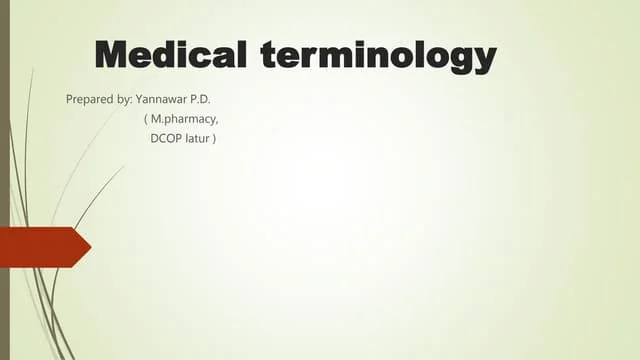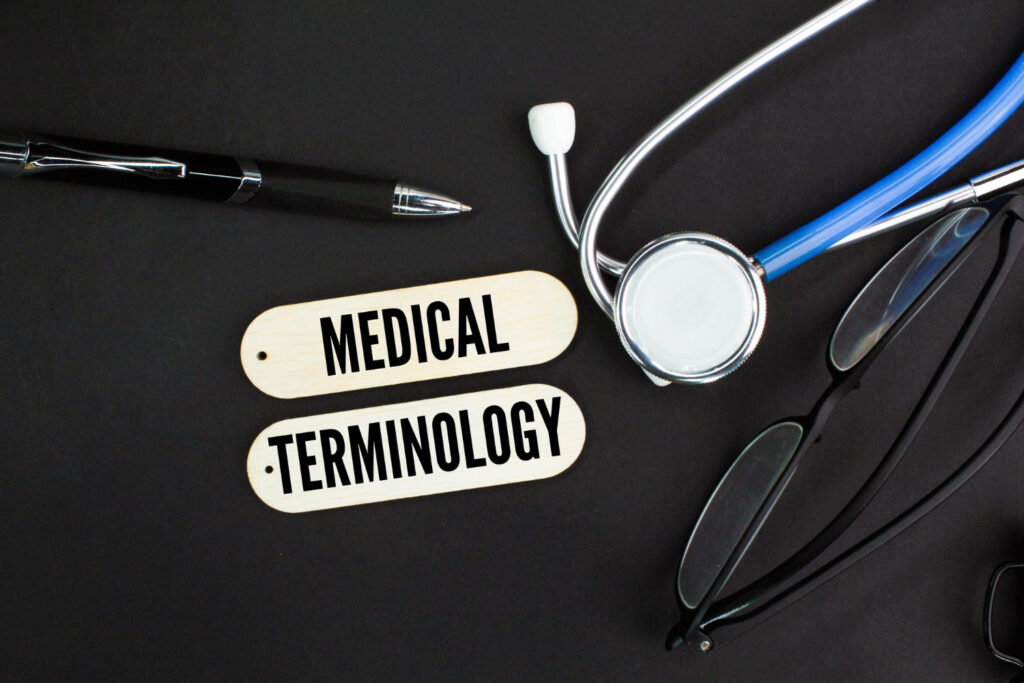Medical terminology is a specialized vocabulary used in the field of medicine to precisely describe the human body, its components, processes, conditions, and medical procedures. It serves as a standardized language that allows healthcare professionals to communicate effectively and accurately. For anyone entering the medical field or even those interested in understanding their own healthcare, grasping the basics of medical terminology is essential.
Why Learn Medical Terminology?

Understanding medical terminology offers numerous benefits:
- Effective Communication: It allows healthcare professionals to communicate clearly and accurately with each other, ensuring patient safety and minimizing errors.
- Understanding Medical Records: Knowledge of medical terminology enables you to comprehend patient charts, medical reports, and other healthcare documentation.
- Career Advancement: For those working in healthcare or seeking medical certifications, a strong understanding of medical terms is crucial for success.
- Informed Healthcare Decisions: Even as a patient, understanding medical terms can help you better understand your medical benefits, diagnoses, and treatment options.
Basic Components of Medical Terms
Most medical terms are constructed from three basic components:
- Root Word: The foundation of the term, usually indicating a body part or system. Most root words originate from Latin or Greek.
- Prefix: Added to the beginning of a term, the prefix usually indicates a location, direction, type, quality, or quantity.
- Suffix: Attached to the end of a term, the suffix may denote a specialty, test, procedure, function, disorder, or status.
In addition to these components, a combining vowel (usually “o”) is often added between word parts to ease pronunciation.
Analyzing Medical Terms: A Step-by-Step Approach
To decipher an unfamiliar medical term, follow these steps:
- Identify the Suffix: Begin by identifying the suffix, as it often indicates the term’s primary meaning (e.g., a condition, procedure, or specialty).
- Identify the Prefix: Next, identify the prefix (if present), which modifies the root word’s meaning.
- Identify the Root Word(s): Locate the root word(s), which form the core meaning of the term, usually referring to a body part.
- Combine the Meanings: Combine the meanings of the suffix, prefix, and root word(s) to arrive at the overall meaning of the term.
Common Prefixes, Root Words, and Suffixes

To begin your journey into medical terminology, familiarize yourself with some common prefixes, root words, and suffixes:
Prefixes:
- a-, an-: absence, lack of
- ab-: away from
- ad-: toward, near
- bi-: two
- brady-: slow
- contra-: against, opposite
- dys-: difficult, painful
- hyper-: excessive, above normal
- hypo-: deficient, below normal
- inter-: between
- intra-: within
- macro-: large
- micro-: small
- multi-: many
- tachy-: rapid
Root Words:
- cardi/o: heart
- gastr/o: stomach
- hepat/o: liver
- nephr/o: kidney
- neur/o: nerve
- oste/o: bone
- pneum/o: lung
- arthr/o: joint
- derm/a: skin
- my/o: muscle
Suffixes:
- -itis: inflammation
- -algia: pain
- -ectomy: surgical removal
- -otomy: incision
- -ostomy: surgical opening
- -scopy: visual examination
- -graphy: recording
- -gram: record, image
- -pathy: disease
- -oma: tumor
Examples of Medical Terms and Their Deconstruction
Let’s break down some medical terms to illustrate how these components work together:
- Electrocardiogram (ECG or EKG)
- Prefix: electro- (related to electricity)
- Root: cardi/o (heart)
- Suffix: -gram (record, image)
- Meaning: A recording of the electrical activity of the heart.
- Hypertension
- Prefix: hyper- (excessive, above normal)
- Root: tens- (pressure)
- Suffix: -ion (condition)
- Meaning: Unusually high blood pressure.
- Arthritis
- Root: arthr/o (joint)
- Suffix: -itis (inflammation)
- Meaning: Inflammation of a joint.
- Gastrectomy
- Root: gastr/o (stomach)
- Suffix: -ectomy (surgical removal)
- Meaning: Surgical removal of the stomach.
- Neurology
- Root: neur/o (nerve)
- Suffix: -logy (study of)
- Meaning: The study of the nervous system.
Common Medical Abbreviations and Acronyms
In addition to medical terms, healthcare professionals frequently use abbreviations and acronyms:
- AC: Ante cibum, or “before meals,” indicating when a patient should take medication.
- ADR: Adverse drug reaction.
- ALOC: Acute loss of consciousness.
- BMI: Body mass index, a measurement of body fat based on height and weight.
- BP: Blood pressure, a measurement of the pressure exerted by the flow of blood upon vessel walls.
- CHF: Congestive heart failure.
- DNR: Do not resuscitate, an indication that the patient does not want CPR or other life-saving procedures performed on them.
- EMS: Emergency medical services.
- FX: Fracture.
- HR: Heart rate, the number of times a person’s heart beats, usually measured per minute.
- LFT: Liver function test.
- MRI: Magnetic resonance imaging, diagnostic imaging that uses magnetism and radio waves to produce images of internal organs.
- PT: Physical therapy.
- Rx: Prescription.
- UTI: Urinary tract infection.
Tips for Mastering Medical Terminology
- Learn Root Words, Prefixes, and Suffixes: Focus on memorizing the most common word parts and their meanings.
- Use Flashcards: Create flashcards to help you memorize terms and their definitions.
- Practice Regularly: Practice breaking down and defining medical terms regularly to reinforce your knowledge.
- Utilize Online Resources: Explore online dictionaries, medical terminology courses, and other resources to expand your understanding.
- Contextual Learning: Pay attention to how medical terms are used in real-world healthcare settings.
- Relate to Common Words: Connect medical terms to everyday words to make them more memorable.
By understanding the basic components of medical terms, learning common prefixes, root words, and suffixes, and practicing regularly, anyone can begin to master this essential language. Whether you’re pursuing a career in healthcare or simply want to better understand your own health, a solid foundation in medical terminology is a valuable asset.
Also Read : Top Liver Transplant Hospitals In India




